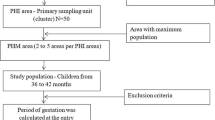Abstract
Objective The purpose of the present study was to investigate factors associated with quality of life (QOL) among mothers raising 4 and 18-month-old infants. Methods A cross-sectional study was conducted using self-report questionnaires. Participants included 400 women who took their infants for health checkups at a city in Aichi Prefecture, Japan (4-month-olds: n = 197, 18-month-olds: n = 203). Study variables included the World Health Organization Quality of Life-BREF (WHOQOL-BREF) scale, mother’s lifestyle, support from family, and other factors potentially related to QOL. Results For mothers of 4-month-old infants, total QOL was associated with emotional support from families (OR 6.09, 95% CI 2.13–17.43) and having enough sleep (7 h or more; OR 4.18, 95% CI 1.86–9.36). These mothers had shorter sleeping hours than mothers of 18-month-old infants. QOL of mothers of 18-month-old infants was associated with emotional support from families (OR 3.06, 95% CI 1.14–8.22) and using childrearing support facilities (OR 2.02, 95% CI 1.01–4.01). Conclusion Different factors contributed to mothers’ QOL as a function of infant age. Emotional support from families was associated with better QOL in both mother groups. Differences were that for mothers of 4-month-old infants, enough sleep was relevant to QOL, while in mothers of 18-month-old infants, childcare services helped improving their QOL.
Similar content being viewed by others
References
Akyn, B., Ege, E., Kocodlu, D., Demiroren, N., & Yylmaz, S. (2009). Quality of life and related factors in women, aged 15–49 in the 12-month post-partum period in Turkey. Journal of Obstetrics and Gynaecology Research, 35(1), 86–93. https://doi.org/10.1111/j.1447-0756.2008.00870.x.
Arimoto, A., & Murashima, S. (2007). Child-rearing anxiety and its correlates among Japanese mothers screened at 18-month infant health checkups. Public Health Nursing, 24(1), 101–110.
Arimoto, A., & Murashima, S. (2008). Utilization of parenting groups and consultation services as parenting support services by Japanese mothers of 18 month old children. Japan Journal of Nursing Science, 5, 73–82.
Coley, R. L., & Lombardi, C. M. (2013). Does maternal employment following childbirth support or inhibit low-income children’s long-term development? Child Development, 84(1), 178–197. https://doi.org/10.1111/j.1467-8624.2012.01840.x.
Darcy, J. M., Grzywacz, J. G., Stephens, R. L., Leng, I., Clinch, C. R., & Arcury, T. A. (2011). Maternal depressive symptomatology: 16-month follow-up of infant and maternal health-related quality of life. Journal of the American Board of Family Medicine, 24(3), 249–257. https://doi.org/10.3122/jabfm.2011.03.100201.
de Tychey, C., Briancon, S., Lighezzolo, J., Spitz, E., Kabuth, B., de Luigi, V., … Vincent, S. (2008). Quality of life, postnatal depression and baby gender. Journal of Clinical Nursing, 17(3), 312–322.
Eastwood, J. G., Jalaludin, B. B., Kemp, L. A., Phung, H. N., & Barnett, B. E. (2012). Relationship of postnatal depressive symptoms to infant temperament, maternal expectations, social support and other potential risk factors: Findings from a large Australian cross-sectional study. BMC Pregnancy Childbirth, 12(1), 1. https://doi.org/10.1186/1471-2393-12-148.
Gay, C. L., Lee, K. A., & Lee, S. Y. (2004). Sleep patterns and fatigue in new mothers and fathers. Biological Research for Nursing, 5(4), 311–318.
Giallo, R., Cooklin, A., & Nicholson, J. M. (2014). Risk factors associated with trajectories of mothers’ depressive symptoms across the early parenting period: An Australian population-based longitudinal study. Archives of Women’s Mental Health, 17(2), 115–125. https://doi.org/10.1007/s00737-014-0411-1.
Kusano, E., Ono, M., & Hayakawa, K. (2010). Influence of support by elderly persons on Japanese mothers’ child care-related stress. Nursing and Health Sciences, 12(2), 182–190. https://doi.org/10.1111/j.1442-2018.2010.00516.x.
Monti, F., Agostini, F., Marano, G., & Lupi, F. (2008). The course of maternal depressive symptomatology during the first 18 months postpartum in an Italian sample. Archives of Women’s Mental Health, 11(3), 231–238. https://doi.org/10.1007/s00737-008-0017-6.
Munakata, T., Nakao, T., Fujita, K., & Suwa, S. (1986). Stressor, coping resources, and mental health in an urban population. Journal of Mental Health, 32, 49–68.
Nohara, M. (2012). A longitudinal study on quality of life in pregnant women and nursing mothers. Journal of Child Health, 71(6), 828–836.
Nohara, M., & Miyagi, S. (2009). Family support and quality of life of pregnant women during pregnancy and after birth. Nihon Koshu Eisei Zasshi, 56(12), 849–862.
Rullo, G., & Musatti, T. (2005). Mothering young children: Child care, stress and social life. European Journal of Psychology of Education, 20(2), 107–119.
Sekijima, K. (2012). Physical conditions of mothers in early parenthood. Japanese Journal of Maternal Health, 53(2), 375–382.
Shrestha, S., Adachi, K., Petrini, M. A., & Shrestha, S. (2014). Factors associated with post-natal anxiety among primiparous mothers in Nepal. International Nursing Review, 61(3), 427–434. https://doi.org/10.1111/inr.12118.
Smith, L. E., & Howard, K. S. (2008). Continuity of paternal social support and depressive symptoms among new mothers. Journal of Family Psychology, 22(5), 763–773. https://doi.org/10.1037/a0013581.
Takeda, F., Miyaji, F., Yamaguchi, T., & Nozaki, S. (1998). Postpartum depression and social support. Nihon Koshu Eisei Zasshi, 45(6), 564–571.
Tazaki, M., & Nakane, M. (1997). WHOQOL26 guidance. Tokyo: Kaneko-shobo.
The WHOQOL Group. (1998). Development of the World Health Organization WHOQOL-BREF quality of life assessment. Psychological Medicine, 28(3), 551–558.
Webster, J., Nicholas, C., Velacott, C., Cridland, N., & Fawcett, L. (2011). Quality of life and depression following childbirth: Impact of social support. Midwifery, 27(5), 745–749. https://doi.org/10.1016/j.midw.2010.05.014.
Author information
Authors and Affiliations
Corresponding author
Ethics declarations
Funding and Disclosure
We have no possible conflict of interest and funding.
Rights and permissions
About this article
Cite this article
Nishida, T., Tanaka, Y. & Sakakibara, H. Factors Associated with Quality of Life Among Mothers Rearing 4- and 18-Month Old Infants in Japan. Matern Child Health J 22, 1217–1225 (2018). https://doi.org/10.1007/s10995-018-2493-2
Published:
Issue Date:
DOI: https://doi.org/10.1007/s10995-018-2493-2




